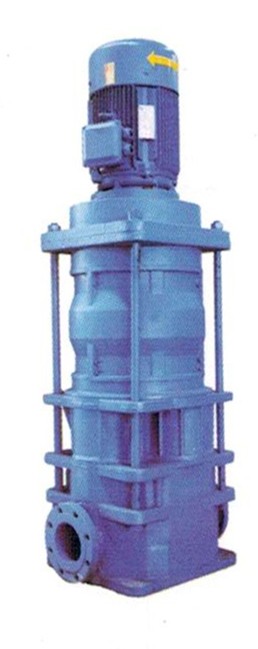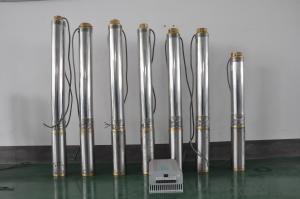Solar Pump Water Well L3D-30-240
- Loading Port:
- China Main Port
- Payment Terms:
- TT OR LC
- Min Order Qty:
- -
- Supply Capability:
- 300 sets unit/month
OKorder Service Pledge
OKorder Financial Service
You Might Also Like
Product description:
Product: Solar water pump
Model:L3D-30-240
Appilication:
surface pump
for surface water of pond, river, lake
for irrigation of a big farm with 20000 m2 on the top of a mountain
Product specification:
flow rate:30m3/ hour, 210m3/day.
lift: 10m-240m
pump diameter: 610mm
Pump installed on the ground, outlet to the water surface:4m
with AC motor, motor power:22kW
but only need solar power:22kW(while Grundfos pump needs at least 45kW solar power, our pump can save more than 50% solar panel power,save USD15000 cost for solar panel per set.
Material:
Pump inside: stainless steel and wearable nylon,it enables our solar pump to have 10 years sevice life.
Motor : AC motor, 380V , three phase , 50Hz. The pump also can connect with grid power directly.
Certification:
3 International patent
ISO9001
CE
Warranty:2 years
- Q: Can solar pumps be used for water supply in greenhouses or nurseries?
- Yes, solar pumps can be used for water supply in greenhouses or nurseries. Solar pumps are an efficient and sustainable solution for providing water to plants in these settings. They can be powered by solar panels, which convert sunlight into electricity, making them environmentally friendly and cost-effective. Solar pumps can help maintain optimal water levels and irrigation systems in greenhouses or nurseries, promoting healthy plant growth and reducing water wastage.
- Q: How does a solar pump handle water with high levels of bacteria or viruses?
- A solar pump does not directly handle bacteria or viruses in water. However, it can play a role in providing clean water by pumping water from a contaminated source into a separate filtration or purification system. This system can effectively remove or kill bacteria and viruses, ensuring the water is safe for consumption or other uses.
- Q: Can a solar pump be used in areas with high levels of bacteria or contamination in water?
- Yes, a solar pump can be used in areas with high levels of bacteria or contamination in water. Solar pumps are primarily used to draw water from a source, such as a well or a reservoir, and are not directly involved in water purification. However, the water drawn through a solar pump can be further treated or purified using appropriate methods to ensure its safety for consumption or other purposes.
- Q: Can a solar pump be used for dewatering or drainage purposes?
- Yes, a solar pump can be used for dewatering or drainage purposes. Solar pumps are designed to use solar energy to power the pump and they can efficiently drain water from an area or dewater a specific location. The solar-powered pump operates similarly to traditional pumps, but it uses solar panels to convert sunlight into energy, making it a cost-effective and environmentally friendly option for dewatering or drainage needs.
- Q: Can a solar pump be used in cold climates with freezing temperatures?
- Yes, a solar pump can be used in cold climates with freezing temperatures. However, it is important to ensure that the solar pump is designed and equipped to handle freezing conditions. This can be achieved by using materials that are resistant to freezing, insulating the pump, and incorporating features like antifreeze or a freeze protection system. By taking these precautions, a solar pump can effectively operate in cold climates and continue to function despite freezing temperatures.
- Q: What is the expected efficiency degradation of a solar pump over time?
- The expected efficiency degradation of a solar pump over time can vary depending on various factors such as the quality of the pump, maintenance practices, environmental conditions, and usage patterns. Generally, solar pumps are designed to be highly efficient and durable, with minimal degradation over their operational lifespan. In well-maintained systems, the efficiency degradation of a solar pump can be relatively low, typically around 1-2% per year. This means that the pump's performance may decrease slightly over time, but it should continue to operate effectively for many years. However, certain factors can accelerate efficiency degradation. For example, if the pump is exposed to harsh environmental conditions like extreme heat, dust, or corrosive elements, it may experience more significant efficiency losses. Similarly, if the pump is not properly maintained, such as neglecting regular cleaning or failing to replace worn-out components, its efficiency can decline at a faster rate. Additionally, the usage pattern and workload of the pump can impact its efficiency degradation. If the pump is consistently operated at or near its maximum capacity, it may experience more rapid wear and tear, leading to a higher efficiency loss over time. To minimize efficiency degradation, it is crucial to invest in a high-quality solar pump from a reputable manufacturer, adhere to recommended maintenance practices, and ensure that the pump is correctly sized for the intended application. Regular inspections, cleaning, and timely replacement of worn-out parts can help maintain the pump's efficiency and prolong its lifespan. Overall, while some efficiency degradation is expected in solar pumps over time, proper installation, maintenance, and usage can help mitigate this degradation and ensure optimal performance for an extended period.
- Q: Are solar pumps environmentally friendly?
- Yes, solar pumps are environmentally friendly. They use clean and renewable energy from the sun to power the pumps, eliminating the need for fossil fuels. This reduces greenhouse gas emissions and air pollution. Additionally, solar pumps have minimal environmental impact as they do not require the extraction of natural resources and have lower maintenance and operational costs compared to traditional pumps.
- Q: Solar water heater computer controller shows Sheung Shui, booster pump does not start Sheung Shui, how to do
- First look at the control panel signal line is not bad contact, check the water level probe, if these aspects are no problem, then you turn off the power after 3 minutes, at the start.
- Q: Can solar pumps be used for swimming pool circulation?
- Yes, solar pumps can be used for swimming pool circulation. Solar pumps use the energy from the sun to power the pump, eliminating the need for electricity. They are an eco-friendly and cost-effective option for pool circulation, ensuring proper water circulation and filtration.
- Q: Are solar pumps suitable for use in agricultural greenhouses?
- Yes, solar pumps are suitable for use in agricultural greenhouses. Solar pumps provide a sustainable and cost-effective solution for greenhouse irrigation needs. They can efficiently operate with solar energy, reducing electricity costs and dependence on fossil fuels. Solar pumps are eco-friendly, reliable, and can be tailored to meet the specific water requirements of plants in greenhouses.
Send your message to us
Solar Pump Water Well L3D-30-240
- Loading Port:
- China Main Port
- Payment Terms:
- TT OR LC
- Min Order Qty:
- -
- Supply Capability:
- 300 sets unit/month
OKorder Service Pledge
OKorder Financial Service
Similar products
Hot products
Hot Searches
Related keywords


















